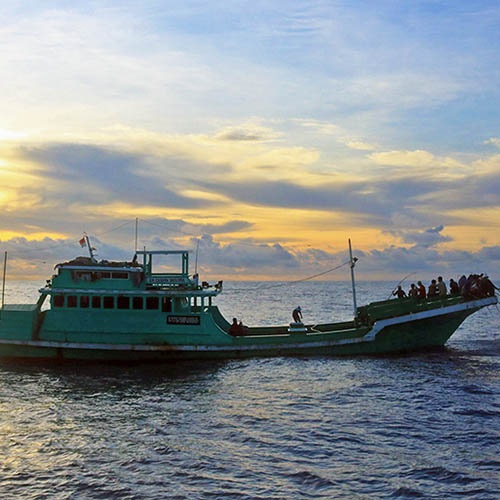Sustainable fish stocks are at the heart of the MSC program. Ensuring that the world’s fish stocks remain healthy is vital for marine ecosystems and global food security.
To meet the requirements of Principle 1 of the MSC Fisheries Standard, sustainable fisheries should have a robust and precautionary harvest strategy in place.
A harvest strategy is the combination of monitoring, stock assessment, harvest control rules and management actions that are required to bring about the sustainable management of the fishery.However, for certain stocks, such as those managed by Regional Fisheries Management Organisations (RFMOs), the development and implementation of harvest strategies is particularly challenging, putting many fisheries at risk of suspension from the MSC program and impacting their long-term sustainability.
How has our Standard changed?
In the new version of our Standard, RFMO managed fisheries are now required to deliver specific milestones for the development and adoption of state-of-the-art harvest strategies.
The new requirements (under Section SE) represent a significant increase in the expectations of certified fisheries that are managed by RFMOs, in order to implement effective stock-wide harvest strategies. This will help such fisheries overcome challenges associated with international governance decision making.
Find out more about our new requirements for harvest strategies below.
Addressing issues fisheries may face in resolving conditions of certification related to harvest strategies
The new Standard includes requirements that incentivise the development and adoption of state-of-the-art harvest strategies for stocks managed by RFMOs. This includes conducting management strategy evaluation to evaluate harvest strategies and the adoption of catch or effort constraint mechanisms
These requirements provide a clear pathway with associated milestones for fisheries to adopt effective harvest strategies and close their conditions. At the end of the process, such fisheries will need to meet a higher level of performance (SG 100) with respect to the harvest strategy. Balancing this higher expectation, is an allowance for additional time to develop and implement the harvest strategy and harvest control rules.
These requirements, found within the new Section SE, will be mandatory for RFMO managed fisheries, however they can be applied on an optional basis for other fisheries.
Application of Section SE
Fisheries will be permitted to undertake early application of Section SE ahead of their next full reassessment. This can only occur if the majority of units of certification with the same target stock agree to early application.
If fisheries that are already certified choose to undertake early application of Section SE, they must be reassessed to version 3.0 of the MSC Fisheries Standard in full at their next reassessment, irrespective of the implementation timelines.
The milestones to achieve SG100 for harvest strategies within Section SE must be aligned for all MSC certified fisheries that catch a particular stock. As a result, fisheries will need to work together, collaborating with scientists, fisheries managers and governments to meet the milestones needed for them to maintain certification and helping to drive a unanimous push towards the adoption of harvest strategies.
Fisheries wishing to undertake early application of Section SE can do so until 01 February 2026.
Time-limits for resolving conditions
In recognition of the significant increase in expectations and the time required to develop and implement harvest strategies within Section SE, fisheries will have longer to resolve their conditions of certification.
The length of time given to resolve Principle 1 conditions for harvest strategies and harvest control rules is dependent on the previous certification history of the Principle 1 target stock. The target stock here refers to the stock assessed within the Principle 1 Unit of Assessment (UoA).
- Fisheries with a target stock entering the program for the first time (e.g., the stock has not been part of a previous certification) will be given a maximum of ten years – or two certification cycles – to develop and adopt a state-of-the-art harvest strategy (SG100).
- Fisheries with a target stock that have had one or more previous certifications will have a maximum of five additional years to meet their conditions.
This new approach to conditions will give RFMO managed fisheries more robust harvest strategies and harvest control rules at the end of the process, increasing the long-term sustainability of the target stocks. The timebound nature of the pathway and milestones also ensures that MSC certified fisheries can work collaboratively at the RFMO level.
These changes will also simplify the requirements as it offers CABs more structure in how conditions are set, strengthening their ability to audit effectively. Simplification is further supported as any subsequent assessment needs to adopt the timeline to meet the milestones from the first fishery that becomes certified against Section SE.
Condition milestones
Fisheries will be set pre-defined milestones, with progress audited by an independent conformity assessment body (CAB). A considerable amount of collaboration will be needed between scientists and policy makers throughout this process, in order to deliver state-of-the-art harvest strategies.
This approach will also provide CABs more structure in how conditions are set, strengthening their ability to audit effectively.
Phase 1 – ‘Science focus’ milestones
Fisheries must demonstrate they are developing a harvest strategy and have completed a management strategy evaluation (MSE). Harvest strategies developed through MSE are more robust to uncertainty and allow the testing and definition of specific management objectives.
- Management objectives related to the development of the harvest strategy, performance indicators and data defined.
- Operating models and potential management procedures (MPs) that include mechanisms to reducing fishing pressure on the stock and is impact tested through MSE simulations.
- Demonstration of consultation and input from stakeholders.
- Preferred harvest strategy(s) adhering to a management procedures (MP)s approach with an agreed catch constraint identified, such as a total allowable catch (TAC) or closure period.
Phase 2 – ‘Policy focus’ milestones
These milestones focuses on implementing the new harvest strategy policy. A key step will be to ensure fisheries managers agree to and adopt the strategy proposed and put in place mechanisms to manage catches accordingly.
- Mechanism for catch constraints agreed.
- Harvest strategy adhering to management procedures (MP) approach with catch constraints or resource sharing mechanism that follows scientific advice, adopted and implemented.
- A schedule plan agreed that periodically reviews the effectiveness of the harvest strategy.
Fisheries entering the program for the first time must complete the Phase 1 milestones before the second phase can begin, with both phases completed in a maximum of one certification cycle (five years) each.
Fisheries with stocks that have been previously certified are not required to complete the milestones in two distinct phases, however all milestones will be the same and must be completed within one certification cycle.
Find out more about the new requirements and impacts for fisheries managed by RFMOs.
Clarifying existing requirements in the default tree for the assessment of harvest strategies
The new Standard will include definitions for both ‘responsive’ harvest strategy and ‘designed’ harvest strategy to the Fisheries Standard requirements. This will help ensure fisheries are scored consistently.
A responsive harvest strategy is one that allows stock management to adapt to the development and implementation of other elements in the strategy such as harvest control rules and to demonstrate that positive action has been taken by management when required.
A designed harvest strategy includes a management procedure which has been developed through management strategy evaluation. This uses a computer simulation, allowing various scenarios and impacts of management procedures to be tested. It uses algorithm-based rules to simulate outcomes and is the most robust way to develop and implement a harvest strategy.
Implementing the new requirements
If a majority of certified fisheries agree to do so, fisheries can undertake the early application of Section SE. The process for early application can be found in the MSC Fisheries Standard Toolbox.
The deadline for fisheries to announce their intent to apply Section SE early has been extended to 01 February 2026.
If early application of Section SE does not occur, certified fisheries now have until 01 November 2030 to transition to the new version of our Standard.
This follows a derogation issued on 01 February 2024.
Find out more and read the derogation for further details on how this impacts fisheries, including those applying Section SE early.
Developing our Standard
In 2022, we published Version 3.0 of the MSC Fisheries Standard following the most comprehensive review to date.
The development of the Standard follows public consultation on key aspects of the review, including a 60-day public review of the draft Standard and all associated documents.
We also commissioned independent research and carried out data analysis and impact assessments to determine whether proposals are feasible and deliver our stated intentions. We also sought advice and input from our governance bodies throughout the process.Read our key publications below:
- Impact Assessment Report - Harvest Strategies (April 2022)
- Impact Assessment Report - Reviewing Principle 1 with a focus on harvest strategies (Nov 2021)
- Consultation summary report – Proposed revised MSC Fisheries Standard (May 2022)
- Consultation summary report – Reviewing Principle 1 with a focus on harvest strategies – (June 2021)
- Consultation summary report – Feasibility of Principle 1 changes for existing requirements – (October 2020)
- Responsive Harvest Strategies – MER Consultants LLC (March 2018)
Management Strategy Evaluation - Roadmap
To aid in the implementation of the new requirements, the MSC commissioned a report to outline the practical ways that management strategy evaluation (MSE) can be undertaken and implemented.
The report (below) uses practical experience to help fishery
managers, stakeholders, and scientists better understand how to apply the approach to fisheries regardless of size.

MSC Fisheries Standard version 3.0
An overview of the changes made to our Standard.

Fisheries Program Documents
The MSC Fisheries Standard and General Certification Requirements.

